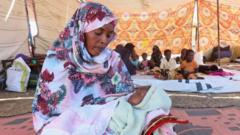**The blocking of a crucial ceasefire resolution for Sudan by Russia has ignited strong reactions from Western nations, highlighting the complex geopolitical dynamics influencing the humanitarian crisis in the region.**
**Russia's Veto Sparks Outrage Over Sudan Crisis Resolution at UN**

**Russia's Veto Sparks Outrage Over Sudan Crisis Resolution at UN**
**International community divided as Russia blocks UK-led ceasefire efforts amid a worsening humanitarian disaster in Sudan.**
In a significant and contentious move at the United Nations, Russia has exercised its veto power against a draft resolution proposed by the UK and Sierra Leone that aimed to establish a ceasefire in Sudan. This action was met with sharp criticism from the United Kingdom and the United States, who condemned Russia's decision as a “disgrace.” British Foreign Secretary David Lammy expressed profound dismay, emphasizing the need for urgent action in light of the humanitarian crisis that has unfolded in Sudan.
The ongoing civil war in Sudan, which erupted in April 2022 between the nation’s army and the paramilitary group known as the Rapid Support Forces (RSF), has led to a catastrophic humanitarian scenario. With over 11 million people displaced and tens of thousands dead, recent reports indicate that the situation has reached alarming levels, with many facing starvation and severe violations of human rights, including sexual violence against women.
Despite the support of other 14 Security Council member states in favor of the UK-backed resolution, Russia's veto meant the draft could not advance. Lammy's remarks during the Security Council meeting were pointed, urging the Russian representative to consider the human toll of the conflict and questioning the international implications of Russia's actions.
In stark contrast, Russia defended its veto, with Dmitry Polyanskiy, Russia’s representative at the UN, asserting that the resolution undermined Sudanese sovereignty and interference in its internal affairs. He criticized the UK for allegedly seeking to escalate hostilities in the region to align with Western interests.
Sudan's representation at the UN also conveyed dissatisfaction with the proposed resolution, citing that clauses condemning support for the RSF from external actors like the United Arab Emirates were missing. Sudan’s official insisted on the need for greater acknowledgment of the RSF’s actions, which have been labeled as potential war crimes.
As the international community grapples with the complexities of the Sudan crisis, the implications of this veto may significantly affect the lives of millions still caught in the crossfire. The dialogue surrounding human rights, sovereignty, and foreign intervention continues, reflecting broader geopolitical narratives tied to the future of Sudan and its stability.




















